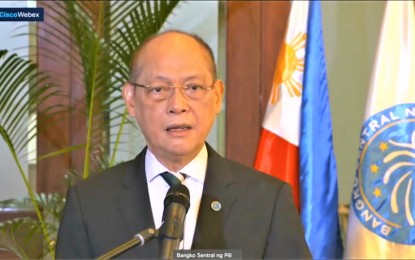
BSP Governor Benjamin Diokno (File photo)
MANILA – The Philippines continues to have sound macroeconomic fundamentals and enough policy buffers to counter potential capital flow volatility from the looming interest rate normalization in major economies.
Bangko Sentral ng Pilipinas (BSP) Governor Benjamin Diokno, in a virtual briefing on Thursday, said an earlier-than-expected normalization in major central banks will likely lead to a sharp tightening of global financial conditions and will negatively hit emerging markets (EMs) such as the Philippines.
“The Philippines remains in a sound position to weather these external headwinds on account of its strong, sound macroeconomic fundamentals,” he said.
Major economies such as the United States and China are posting improvements from the pandemic-related economic difficulties due in part to the faster rollout of the vaccination program against the coronavirus disease 2019 (Covid-19).
This, in turn, paves the way for the eventual tightening of monetary policies, which may result in possible financial volatility when not communicated properly, Diokno said.
He said that for one the Federal Reserve has been signaling its tightening plan to guide markets globally.
Citing the latest Fed dot plot, which maps out US monetary authorities’ expectations on where interest rates are headed, Diokno said Fed members are divided on whether it is appropriate to start hiking key policy rates by next year, although the median projection is steady policy rate until 2023.
Diokno said the earlier-than-expected rate hike will have adverse effects on EMs like what happened during the “taper tantrum” in 2013.
“Amid a repricing of risks of financial assets and capital retrenchments from emerging markets, this can subsequently lead to depreciation pressures on the exchange rates of emerging market currencies. Depending on the proportion of external debt exposure of nonfinancial corporates, depreciation pressures could, in turn, weaken corporate sector recovery,” he said.
The central bank chief, however, noted that most Philippine corporates can still service interest payments on near-term debts and most of their bond issuances are denominated in Philippine peso.
“This is an indication that firms could be, to some extent, insulated should there be depreciation pressures linked with the potential rise in interest rates,” he said.
With the country’s macroeconomic fundamentals intact, Diokno said the country is now in a better position to deal with external shocks.
He also said the BSP remains data-dependent and is closely monitoring the impact of both onshore and offshore developments vis-à-vis its policy stance to prevent any premature withdrawal of policy stimulus and safeguard emerging risks.
“When domestic developments warrant a withdrawal of policy support as economic recovery gains traction, the BSP will ensure a smooth transition in winding down its time and state-bound measures. At the same time, the BSP will continue to coordinate closely with fiscal authorities to ensure enough policy support remains for the economic recovery to be sustained,” he added. (PNA)
